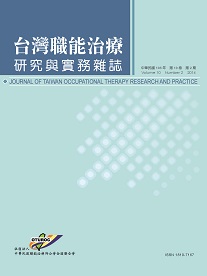Journal of Taiwan Occupational Therapy Research and Practice

半年刊,正常發行
目的:母乳哺餵對母子雙方、家庭、社會及環境有莫大助益。為了提昇母乳哺餵率,世界各國很重視改善母嬰親善環境。醫療保健人員對母乳哺餵的知識及態度是母嬰親善環境的重要指標。文獻上雖有許多針對產兒科醫師和護理人員的研究,但針對介入哺乳較後期障礙處理的職能治療人員的研究則付諸闕如。本研究以問卷調查方式分析1,266名台灣地區職能治療人員對於母乳哺餵的態度和認知程度。方法:經專家修訂內容及20位預試者回覆並確認可行後,隨即寄發問卷。問卷內容含態度量表9題、知識量表50題及基本資料。結果:回收585份,回收率47%,分別為台灣省406份、北市136份及高市43份。態度量表平均分數為4.73±0.68分(滿分6分),知識量表為14.83±4.30分(滿分50分)。對母親的好處、乳房問題、嬰兒問題、及哺乳的禁忌等四類知識題的答題正確率介於10%至20%,泌乳機轉及母乳的營養成分為28%和33%,實際生活應用之哺乳技巧為53%。進一步以逐步迴歸分析發現,態度的主要預測因子依序為知識得分、高中學歷、性別、母乳哺餵相關教育、研究所學歷,及幼時曾被哺餵母乳等六項;知識的主要預測因子依序包含為人父母、態度得分、性別、28至38歲年齡層,及職能治療士等五項。前述因子分別僅能解釋9.5%及15.6%的態度和知識得分的變異量,顯示仍有其他更重要的潛在因素,如社會文化的長期影響。結論:職能治療人員對母乳哺餵持正向態度,但相關知識亟待加強。由於態度及知識互為重要預測因子,且母乳哺餵相關教育為態度之主要預測因子之一,雖然可解釋之變異量不高,但仍建議未來應加強職能治療人員的母乳哺餵教育,此將有助於提供患者較適切的治療,提昇國人母乳哺餵品質。
Objective: Breastfeeding provides diverse and compelling advantages to infants, mothers, families, society, and the environment. Many health authorities have taken actions to build up mother and-baby-friendly environment to protect, promote, and support breastfeeding in order to increase breastfeeding initiation rate and duration. Health care providers' breastfeeding attitudes and knowledge are critical indicators for such an environment. Many studies have addressed the breastfeeding cognition among obstetricians, pediatricians, nurses, and midwives. However, breastfeeding knowledge and attitudes among occupational therapists, who manage breastfeeding difficulties at a later stage, have never been examined. Methods: This study surveyed and analyzed 1,266 Taiwanese occupational therapists' breastfeeding cognition through questionnaire, the content validity of which was reviewed by experts. The questionnaire, which consisted of 9 attitude and 50 knowledge questions, was also tested by 20 pre-testers. Results: Five hundred eighty-five occupational therapists responded to the questionnaire (response rate: 47%), including 406 from Taiwan Province, 136 from Taipei City, and 43 from Kaohsiung City. The mean attitude score was 4.73 (SD=0.68), and the mean knowledge score was 14.83 (SD=4.30). The full score for Attitude subscale was 6 and 50 for Knowledge. The correct answer rate of subscales of breastfeeding benefits to mothers, breast problems, infant problems, and breastfeeding taboo was between 10% to 20%, whereas the correct answer rate of 28%, 33%, and 53% was found for subscales of breastfeeding mechanism, human milk's nutrition, and breastfeeding skills, respectively. Further stepwise linear regression analyses revealed that significant predictors for the score of Attitude subscale, ranked by importance, were knowledge scores, high school diplomas, gender, breastfeeding education, master or above degrees, and breastfeeding during infancy. Significant predictors for the score of Knowledge subscale, ranked by importance, were parenthood, attitude scores, gender, 28-38 year-old age group, and occupational therapy assistants. However, those variables could only account for 9.5% and 15.6% of the variances of the attitude and knowledge scores, respectively. This revealed that there could be other important factors, such as long-term societal and cultural effects. Conclusion: This study concluded that Taiwanese occupational therapists had positive attitude toward breastfeeding although they showed poor knowledge. The results showed that breastfeeding education and the score of Knowledge subscale were main significant predictors for the score of Attitude subscale, and that the score of Attitude subscale was a significant predictor for the score of Knowledge subscale. Though the predictors could account for only a small part of the variances, this study still suggested that providing more breastfeeding education for occupational therapists could help them offer adequate services for clients with breastfeeding difficulties.












